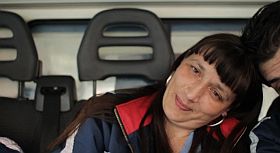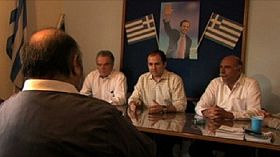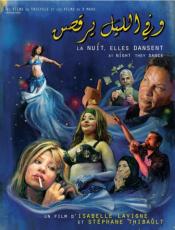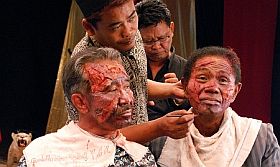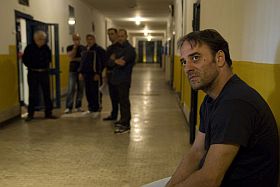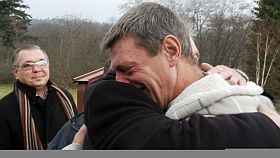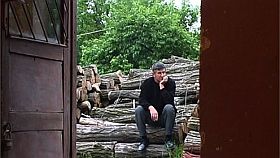


Joshua Oppenheimer: The Act of Killing
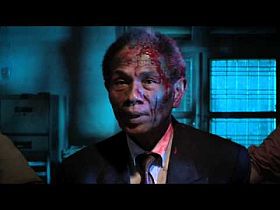
Han sidder der ved det simple træbord. Over for ham sidder forhørslederen ved en skrivemaskine, jeg ved han ved, hvad der skal foregå. Siden jeg som stort barn så Poul Reichhardt i De røde enge i en tilsvarende rolle over for en tyske forhørsleder har det siddet som traumatisk rædsel i mig. Jeg har vidst hvad der nu vil komme til at foregå. Nu kommer torturen. Jeg har i alle filmene siden (Rom, åben by, Slaget om Algier… frem til Deer Hunter måske, erindringen står af…), når den scene nærmede sig, set ned i biografgulvet og som den næste af de tre aber tillige holdt mig for ørerne, til det var forbi. Siden jeg så traileren til The Act of Killing har jeg på grund af den scene frygtet Oppenheimers film på grund af den scene. Torturens forfærdende virkelighed og konstante mulighed og simultane aktualitet i denne verden. Og så skulle det i biografen onsdag aften endda blive værre, meget værre, end jeg frygtede. Til mishandlingen føjede sig de allermest smertefulde ombringelser, som på vore kirkers vægmalerier, som hos maleren Goya, specielt specialiteten: garotten…
Jeg havde fortrængt garotten, glemt massakren i landsbyen, som jo også var med i traileren. Nu sad jeg i biografen og forstod efterhånden lidt mere af det dokumentariske setup og mærkede, at filmen er ubehagelig på andre måder også (Herzog havde ligesom antydet det, og sådan var det…), jeg fik lyst til at gå igen, til at flygte måske, blot liste ud af biografen. Jeg ville ikke være sammen med Oppenheimers medvirkende, jeg kan ikke lide de mennesker, de er latterlige, tror jeg først, men de er meget værre, de er rå, uvidende, pralende, brutale. Jeg skræmmes voldsomt ved deres særegent tydelige intimiderende tone, når de opkræver beskyttelsespenge hos de handlende, jeg kan lugte købmandens angst.
Klippet strammer udviklingen til. Jeg blev siddende i biografen, af høflighed mod min vært, også fordi jeg burde. Det samler sig om én af de medvirkende mordere, Anwar Congo, om én af deres håndværks metoder, en slags primitiv garotte og om én scene, afhøringen ved træbordet. Det er Anwar Congo selv, der spiller den scene i filmens rekonstrukion af forbrydelsen, Han tager offerets rolle, og han får nu, lige der for mine øjne, indsigt i angstens overvældelse, indsigt i denne døds uendelige grusomhed.
Han siger, at han nu ved, hvordan det var, hvor forfærdende. Og Joshua Oppenheimer replicerer fra sin plads ved kameraet: Jamen, dine ofre havde det meget værre, de vidste, de skulle dø. Du ved, at dette er film. Anwar Congo er ikke sikker, hans højre hånd ryster krampelignende, da han mærker ståltråden om sin hals, da kvælningen finder sted. Er det film, eller er det virkelighed? En erkendelse har ramt ham, ham der længe, længe har været forfulgt af hændelserne dengang i sine drømme nu. Og nu er de blevet til pinefulde tanker i vågen, levende live.
“Det er en klassisk filmscene”, sagde Mads Brügger, som var vært i onsdags ved en kort spørgetid med Joshua Oppenheimer, “forbryderen opsøger stedet for sin forbrydelse.” Og ja, de er jo filminteresserede disse mordere, det har de være siden dengang, de var unge og arbejdede som billetkontrollører i biografen. Over for biografen, på den anden side gaden, lå huset, hvor de i en lukket gård myrdede de mange mennesker. Anwar Congo viser beredvilligt derhen, han vil demonstrere deres enkle konstruktion, som sparede dem for al blodet på gårdspladsen: en ståltråd monteres, så han med enkle greb kan kvæle den ene efter den anden. Den ståltråd er central i filmen. I slutscenen, det er nat, opsøger Anwar Congo så, fulgt af Oppenheimer og holdet, endnu en gang denne lukkede gård. Han er denne gang i karrygult jakkesæt af silke, der har nok været aften i byen med de andre før dette spontane indfald, og i den opskruede tilstands svaghed overvælder stedets erindringer ham, og han kaster voldsomt op. I to omgange. Eller, der er vist ikke opkast tilbage, kun lidt slim at se og så mavens konvulsioner og en dødlignende rallen at høre. Det intellektuelt/psykiske gennembrud af empati fra scenen ved træbordet (som han i mellemtiden pralende har vist til sine to børnebørn på tv-skærmen derhjemme, hvor det ene barn dog nægter at se med) er blevet til et fysisk nedbrud eller et kroppens forsøg på renselse. Anwar Congo tørrer sig om munden med bagsiden af den højrehånd, som rystede. Forgæves som Lady Macbeth, der ikke kunne få blodet af sine hænder. Det er slutscenen.
Men der var to filmprojekter, og der er en slutscene mere. Anwar Congo og hans bande har et heroiserende spillefilmprojekt kørende inden i Oppenheimers dokumentarfilm. Og det projekts slutscene er ganske anderledes. Her står Anwar Congo i et storslået landskab med vandfald (igen denne renselse) klædt i kappe som profet og lader sig hylde af to af sine ofre, som vel som repræsentanter for alle de brutalt kvalte hænger en medalje i silkebånd om hans hals efter de har taget ståltråden af deres egne. Det er det sidste jeg mener at se til garotten.
Scenen får ikke slutningens plads, den sidder noget før, for Anwar Congo har, forstod jeg på Joshua Oppenheimer, afstået fra dens opdigtning til fordel for en ærlig dokumentation af et ægte sammenbrud. ”Han er modigt gået ind i mørkets hjerte”, sagde instruktøren under samtalen efter filmen. Måske, måske tænker jeg, men tøver. Indsigten i disse menneskers tanker og handlinger er en voldsom udfordring til min empati og tøvende forståelse. Her mangler jeg Oppenheimers stemme inde i filmen. Han er der konstant på sin plads ved kameraet, jeg hører korte bemærkninger, men der er ikke dette trygge (og dog mindst lige så foruroligende) essay, der hos Herzog som fortællerstemme er med mig konstant. Oppenheimer lader være, og styrende for filmens indre overvejelse, det tavse essay af voldsomme billeder og råben og skrigen, overlader til mig selv at tænke mit eget tavse essay over mysteriet om dette andet menneske, som jeg afskyr og dog er afhængig af – det skræmmer mig usigeligt. Mest skræmmende er måske den unge tv-vært, som muntert lader sig imponere af forbryderne i sit studie og af deres pral med metoden med ståltråden. Hendes smilende overfladiske kynisme fatter ikke garottens virkelighed.
PS
Jeg tager i min læsning af The Act of Killing forbehold over for de besynderlige musik- og danseoptrin i oppustet stil med medvirkende i groteske kostymer. Især den tykke mand henført dansende i karikeret eller ikke karikeret dristigt kvindetøj er mærkelig, mærkelig. Jeg forstår ikke det, jeg læser her. Jo, slutscenen i den film, som banden af mordere og afpressere forsøger at lave ved hjælp af Oppenheimers filmhold er i sin absurde symbolik som nævnt tydelig nok for mig, men ikke de mange andre, og jeg tænker primitivt, at disse øvrige opulente og kulørte scener er rester af dét filmprojekt og skal antyde et lag i en endelig konstruktion, som er opgivet. Og instruktører og klippere har ikke kunnet, ikke villet fjerne det lag helt. Selvfølgelig forholder det sig ikke således, men sådan virker det på mig. Formodentlig til jeg ser filmen igen og igen (hvis jeg tør, som der stod i indbydelsen).
Link til Tue Steen Müllers anmeldelse.
